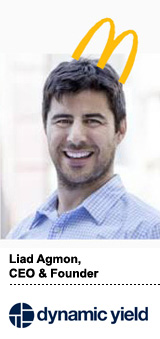
McDonald’s is starting to throw a few ideas on the grill after spending around $300 million to acquire personalization and decision logic tech startup Dynamic Yield in March.
Dynamic Yield’s technology has been integrated into the drive-thru experience at roughly 700 McDonald’s restaurants in North America so far with plans to roll out more and to layer additional personalization features into the McDonald’s app.
The initial use case is to personalize menu displays and digital signage based on real-time signals, such as trending food items, time of day, restaurant traffic or a customer’s own choices.
If someone rolls up to a McDonald’s drive-thru and orders four Happy Meals and nothing else, for example, it’s safe to assume that there’s an adult, perhaps a very stressed out adult, driving a car full of kids. It’s an opportunity for a thoughtful cross sell. “How about a little something for you too – maybe a coffee?”
Subtle recommendations can influence behavior and get people to change their routine and sample new items, said Liad Agmon, CEO and co-founder of Dynamic Yield. The resulting data could help McDonald’s empirically test new products and menu flows.
The coffee cross sell example is not unlike the sort of suggestion Amazon makes to get people to add additional items to their cart. But the approach to personalization in a quick-service restaurant setting has its own nuances to take into account.
“No matter how good the experience is, when you come to McDonald’s to have lunch, you’re not going to eat seven more burgers just because the experience is personalized,” Agmon said. “A burger is not a shirt – once someone’s full, you can’t upsell them.”
McDonald’s hasn’t even really started to scratch the surface on the personalization front yet – and Agmon is staying mum on the brand’s plans for its first-party data – but there’s a reason why McDonald’s, led by CEO Steve Easterbrook, was willing to ante up.
A $300 million acquisition is a good outcome for Dynamic Yield, which raised around $77 million since 2013. But it’s a hedged bet for McDonald’s, which has a $150 billion market value.
“The downside for McDonald’s here is capped – if this doesn’t work, McDonald’s loses about $300 million – but the upside is uncapped,” Agmon said. “You need a CEO who can think that way and take the macro view on where the market is going.”
And so expect more “nontraditional buyers,” particularly marketers, to start kicking the tires on technology startups, Agmon said, pointing to Walmart as the poster child for brand-on-buying-spree.
Agmon is perhaps predisposed to see the market in that way. Before Dynamic Yield, he sold his previous technology startup, a smart social search company called Delver, to Sears way back in 2009.
Others, meanwhile, are skeptical that this is a trend. LUMA Partners CEO Terry Kawaja called the McDonald’s/Dynamic Yield deal “most likely an outlier.”
“Rarely do brands feel sufficiently compelled to actually acquire technology,” Kawaja said in a previous interview. “Their decision tree is usually based on rent vs. buy – I’m not out there expecting Burger King to buy a CDP or something.”
But Agmon insists marketers will start realizing that they need to move faster and get more data-driven to compete, and that the best way to do that is by going big, rather than by partnering and running a few tests here and there.
Look at Barnes & Noble, which was acquired by hedge fund Elliott Advisors for $638 million in early June after struggling and failing to compete with Amazon. B&N is an iconic brand well over 100 years old bought for just over 2X what Dynamic Yield, an eight-year-old startup, commanded.
“A lot of these companies have managed teams that lied to themselves over the years about technology disruption,” Agmon said. “They’d point to their moats and their scale – but now they’re going to start to wake up.”
A brand like McDonald’s gets it, which is why it was willing to acquire Dynamic Yield outright, rather than continue to partner in a client/vendor capacity.
“Sometimes we buy things we could have rented, because owning something creates a different level of attachment or camaraderie even,” Agmon said. “Vendors are not insiders, and being an insider helps accelerate the work. We are part of McDonald’s.”
Dynamic Yield can get off the VC hamster wheel, while McDonald’s can get first dibs on Dynamic Yield’s talent and tech.
McDonald’s created a generous retention scheme to entice Dynamic Yield employees to stay on board after the acquisition. “It’s proof that they do also care about our organic business,” Agmon said, “otherwise, they’d just keep the engineers.”
Dynamic Yield will continue to serve its existing client base of roughly 300 brands, although whether the company will still be able to work with its other quick-service restaurant clients is an open question, Agmon said.
But QSR aside, “if a brand isn’t a competitor, why not?” he said. “McDonald’s is humble in that they know innovation can happen elsewhere, not just in their own building, and they want to learn from that and be challenged by it.”
This post was syndicated from Ad Exchanger.


More Stories
Comic: The Curated Marketplace
INMA Global Media Awards: NZME wins Best Use of Print
Zillow Offers Some Reassurances About Moving After Emotional Bluey Episode